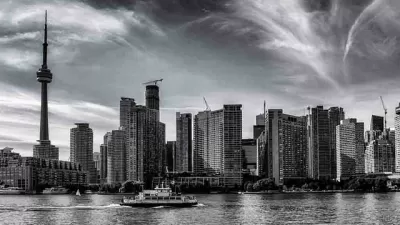A proposal from the provincial government of Ontario would revive an appeals process for planning and development processes in Toronto. An elected official and former planner writes to oppose the idea.

Brad Bradford, current Toronto city councilor and former urban planner, pens an opinion piece for Spacing Toronto that calls for a less political planning process.
"We all know planning in Toronto can be improved," writes Bradford. "Having worked in the City Planning department, I also know the path to better planning is through better politics."
Bradford admits a pro-development agenda in making this appeal, while pointing to specific policies in the city that prevent desired planning outcomes.
Outdated systems like Toronto’s site-by-site community benefits for density bonuses (Section 37 benefits) and certain politicians riding NIMBY sentiment into office have left us stuck with out-of-date zoning, and a strong aversion to change.
Zoning isn’t glamorous but bad rules have left Toronto with too few shelter locations, a misallocated housing stock with around 2 million unused bedrooms, and an oversupply of low density buildings surrounding our major transit corridors.
The op-ed includes a detailed list of prescriptions for change, but one big idea looms over the entire discussion: a proposal by Ontario Premier Doug Ford to revive the Ontario Municipal Board with a new name, the Local Planning Appeal Tribunal. News coverage by Jennifer Pagliaro provides details of that proposal, and reports on the initial political response to the idea.
FULL STORY: OP-ED: Toronto’s planning needs less politics, not more

Study: Maui’s Plan to Convert Vacation Rentals to Long-Term Housing Could Cause Nearly $1 Billion Economic Loss
The plan would reduce visitor accommodation by 25,% resulting in 1,900 jobs lost.

North Texas Transit Leaders Tout Benefits of TOD for Growing Region
At a summit focused on transit-oriented development, policymakers discussed how North Texas’ expanded light rail system can serve as a tool for economic growth.

Why Should We Subsidize Public Transportation?
Many public transit agencies face financial stress due to rising costs, declining fare revenue, and declining subsidies. Transit advocates must provide a strong business case for increasing public transit funding.

How to Make US Trains Faster
Changes to boarding platforms and a switch to electric trains could improve U.S. passenger rail service without the added cost of high-speed rail.

Columbia’s Revitalized ‘Loop’ Is a Hub for Local Entrepreneurs
A focus on small businesses is helping a commercial corridor in Columbia, Missouri thrive.

Invasive Insect Threatens Minnesota’s Ash Forests
The Emerald Ash Borer is a rapidly spreading invasive pest threatening Minnesota’s ash trees, and homeowners are encouraged to plant diverse replacement species, avoid moving ash firewood, and monitor for signs of infestation.
Urban Design for Planners 1: Software Tools
This six-course series explores essential urban design concepts using open source software and equips planners with the tools they need to participate fully in the urban design process.
Planning for Universal Design
Learn the tools for implementing Universal Design in planning regulations.
Ascent Environmental
Borough of Carlisle
Institute for Housing and Urban Development Studies (IHS)
City of Grandview
Harvard GSD Executive Education
Toledo-Lucas County Plan Commissions
Salt Lake City
NYU Wagner Graduate School of Public Service





























